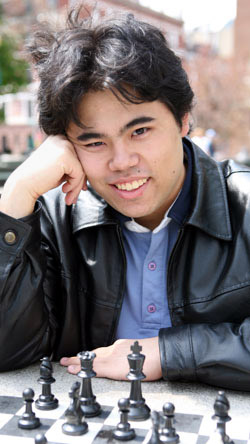Durham News, 7-21-07

GM
Hikaru Nakamura Makes Visit to Durham
Durham News, 7-21-07
Jean
Bethea stood outside the classroom at Durham Academy nervously checking her
camera. Every few minutes, she stuck her blond head into the classroom, clicking
and leaning to get a photo of her son, 13-year-old Alan, playing chess with a
champion.
"This
is the creme de la creme," Bethea whispered, so she didn't distract the
players. "Such a golden opportunity."
Chess
Grandmaster Hikaru Nakamura, 19, stood in the center of the room, playing a
dozen simultaneous games. His 12 opponents were students who paid to spend four
hours observing the champion. They all got beat -- badly -- in order to get
better.
Simply
put, "he's awesome," said 11-year-old Nishanth Shah of Apex, one of
the top elementary school-aged players in the state.
Nakamura,
of White Plains, N.Y., is currently the youngest American Grandmaster, a title
from the World Chess Federation based on his skill and rankings in certain
tournaments. Since age 10, Nakamura has traveled for the game and broken records
along the way, becoming one of the strongest players in the world.
Last
week, he went to Durham Academy on the invitation of Chess Coach Craig Jones.
Jones said he hoped the visit would boost local players' skills and generate
more interest in the game.
Nakamura
floated from board to board. Sometimes, he rubbed his chin or slung a thumb in
the pocket of his Dockers. With each turn, he swept a hand over the board, moved
a piece and tapped the timer, all in one motion.
Alan,
Nishanth and the other competitors recorded each move so later, they could
review their games with Nakamura.
Though
more than a dozen people occupied the small room, only clicks of the chess
timers and heavy breaths, born of concentration and caution, were audible.
Before
the competition began, Jones had made a deferential offer to help the dozen boys
strategize against Nakamura.
"You're
playing a machine," Jones warned. "I don't know how much I'm going to
help anyway."
"Resistance
is futile," 8th-grader Matthew Novak responded.
It
probably was. Jones had set up two seminars at Durham Academy. At the first one,
Nakamura played nine simultaneous games while blindfolded, Jones said. He
imagined the boards and dictated moves, he said.
Despite
the inevitable kills Nakamura would make, the opportunity for feedback from the
respected chess commander was an opportunity to behold. When Bethea learned
Nakamura would be in Durham, she tried to prepare her son Alan.
"I
told him, 'Put some questions together before you go'," she said.
But
based on the quiet in the room, one wondered whether any student would summon
the nerve to say much of anything.
Nakamura
said he wasn't always so good. He started playing chess at age 7 -- later than
many prodigies -- and repeated defeats made it an inauspicious start.
"It
was because I was bad at the beginning that I became so much better,"
Nakamura said.
Nishanth,
the boy from Apex, wiggled in his seat and strategized with Jones, the coach. He
had been to camps before where "there were, like, a million
grandmasters." (Really, there are only 60 in the U.S.)
So
he wasn't really nervous, he said, just before he took one of Nakamura's
ivory-colored bishops and it bounced from the table to the floor. The boy's hand
jumped up and covered an embarrassed smirk.
No, not nervous at all.